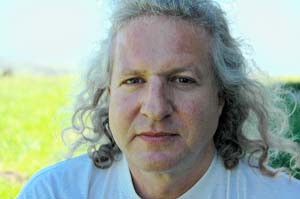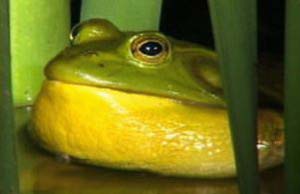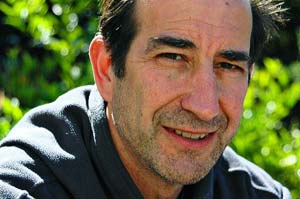The Green Screen
Air Date: Week of July 16, 2005

050715bullFrog.jpg" alt="" height="194" width="300" border="0">
Bullfrog courtesy of midwestfrogs.com website
People who make environmental films say it's too difficult to find airtime on television. So, as Guy Hand reports, they're taking advantage of the advances in digital media to find new ways to reach viewers. San Francisco environmental filmmaker Frank Green. (Photo courtesy of midwestfrogs.com)
Transcript
CURWOOD: It’s Living on Earth. I’m Steve Curwood.
If you go looking for shows that address environmental issues on television, you may be disappointed. There just aren’t that many. Some environmental filmmakers are disappointed, too. They say much of nature television has become a kind of reality TV with fangs that shuns environmental controversy and scientific complexity. Until recently, these frustrated filmmakers had few outlets for the nature films they believe audiences want. But that's changing. Producer Guy Hand reports some are burning new paths to your screen, thanks to that most unnatural of landscapes--the internet.
[SOUND OF RUMMAGING THROUGH VIDEO CASSETTE TAPES]
GREEN: This is a whole wall of nothing but videotapes lined up and each one is catalogued and archived. Some of it is spotted owls, some of it is rivers, some of it is big horn sheep.
HAND: San Francisco environmental filmmaker Frank Green is standing in front of a wall of videotapes, hundreds he's shot over a long career.
GREEN: This is tape number 24 from the big horn sheep film.
HAND: His latest film, "Counting Sheep," follows the last big horn sheep through the precarious heights of California's Sierra Nevada Mountains.
[DRAMATIC MOVIE MUSIC FADES IN]
GREEN: To study sheep in the Sierra Nevada, I mean, I couldn’t ask for a higher privilege.
HAND: It won the People's Choice Award at the 2004 Wild and Scenic Film Festival and has aired on public TV in the San Francisco Bay area. But Green and dozens of filmmakers interviewed across the country say that getting environmental films on television is increasingly difficult. Green blames that, in large measure, on TV executives.
GREEN: They wouldn't know a tree if it fell on them. They have absolutely no connection or understanding of the natural world. And these are the people who are making programming decisions for the whole country.
HAND: Commercial television programmers counter that shows containing the word “environment” suffer low ratings. They say audiences are interested in nature mostly as adventure and light entertainment, not conflict. Green disagrees.
GREEN: Because when I show my films to audiences, when I rent a theater, publicize a film and fill a theater, people invariably say why can't we see this on television?
|
HAND: Filmmakers fear that even PBS might succumb to political pressure, softening or eliminating well-regarded shows like "Nature" and environmental documentaries like the recent "Strange Days on Planet Earth." GREEN: If we continue the current trajectory in the media, you won't be able to air natural history films because they all implicitly have this underlying, underlying structure that says evolution was possible. You'll have natural history films that have to be given with the disclaimer that God created everything you're about to see. HAND: Green is so frustrated, he's leaving the business. GREEN: I'm getting out of it because I'm just tired of fighting people. It would be one thing if you kind of beat yourself up to make a film and then once you got the film made if there was some reward. But it's more a case of beating yourself up to make the film and then beating yourself up to get anybody to see it. So I've just had enough. [SOUND OF A CROWDED ROOM] HAND: But as the aperture appears to narrow for environmental stories on TV, some people are trying to open opportunities through new forms of media. HARLE: The green revolution will not be televised. It's on DVD. HAND: That's the slogan for Suzanne Harle's new distribution company, Green Planet Films . HARLE: Welcome to Eco-a-Go-Go, you guys. Thanks for being here! [CROWDED ROOM, MUSIC, AND APPLAUSE] HAND: Harle has put together a party she calls the Eco-a-Go-Go here in Corte Madera, California to raise funds and awareness for Green Planet Films. Harle got the idea for the company three years ago, at a time when she was considering becoming a filmmaker herself. HARLE: I thought there wasn't enough wildlife films made because they weren't on TV. So I had to go to this film festival to see how I could become a wildlife filmmaker . . . only to determine that there were a lot of films already made. I just didn't know they existed. And so I changed my mind right there in the audience, thinking, “Okay, instead of being another person who can't get their films out, why don't I turn into a distributor?” HAND: Harle now hopes to make her company a sort of green Netflix, delivering nature films right to your mailbox. You can rent or purchase them via the internet. Although sales of her 60 some titles are modest, they've doubled in the last quarter. HARLE: What really surprised us was the international buyers which probably goes to show that there's just not a lot of programming available worldwide. We get emails saying, “Thank goodness we found you.” You know, this is from Germany. [NATIVE AMERICAN MUSIC] HAND: Filmmakers who make environmental advocacy films, films with a point of view, predictably have had an even harder time getting their messages on the air. CONGRESSMAN: There's more oil in ANWR than there is in all of Texas HAND: That's from the soundtrack of “Oil On Ice,” a film project that focuses on drilling for oil in the Arctic National Wildlife Refuge. DJERASSI: In America, you gotta use less.  Filmmaker Dale Djerassi (Photo: Guy Hand ©) |
HAND: Filmmaker Dale Djerassi knows it’s difficult to get films with strong environmental opinions on conventional television. That's why he decided to bypass the broadcast and cable television gatekeepers. With the help of the Sierra Club and others, he and his partners distributed “Oil on Ice” directly to viewers as DVDs. DJERASSI: The market penetration of DVD and DVD players is huge, it's unprecedented. HAND: Djerassi believes that DVDs can not only reach a large audience on their own, but can also convey far more information than a traditional film ever could. DJERASSI: Our DVD has a number of special features, special video features in addition to the one hour film. There's the four hour video. There are interviews with some of the people, there's music, there are kids talking about the issues. This is a web-enabled DVD and allows you to launch directly to web links. So it really is ultimately an activist tool-kit as well as just a home video. HAND: Some environmental filmmakers see so much potential in this new digital media, they've abandoned conventional filmmaking altogether. Academy award nominee and Chicago filmmaker David McGowan has given up TV documentaries in favor of web documentaries or "webumentaries." MCGOWAN: I've had programs on PBS. They air and then they go away (laughing). And even I forget about them. But the web site, you know we're getting like 4500, 5000 visits a month. I think we'll probably hit about 60,000, 70,000 people by the end of this year and that's a decent viewership in a decent PBS market. Yet what's cool is that people keep coming back . HAND: Not only do McGowan's web documentaries live on and evolve, they allow him to focus on the kinds of subjects that cable channels like Discovery and National Geographic might view as too small, too tame, or too technical. MCGOWAN: Their programming tends to have the most dangerous snake or the most poisonous spider. But, a lot of stories that are around us every day aren't getting told. I can't go to Java and film the pygmy rhinoceros and I can't go to Rwanda and do gorillas. So what I've done instead is to look around me and find out what's spectacular in the animals that are here. So that's when I thought “frogs.” [FROG SOUNDS FROM MIDWESTFROGS.COM] HAND: With his initial webumentary, midwestfrogs.com, McGowan still takes his cameras into the field, but focuses on creatures close to home.  Bullfrog, courtesy of midwestfrogs.com website |
MCGOWAN: At first I'm like anybody else. I thought a frog was a frog. And this would never have gotten played on TV. What we're doing is looking at some tiny creature like a peeper, but there are people who study the peeper, and have found out there's all sorts of communication going on in the peeper world. And it may seem insignificant but once you start looking at it, it gives you stories about where animal communication comes from, where communication, in general, comes from. There are a lot of great stories there just right underneath our noses. I think we really do the public a disservice by not focusing more attention on that. And that's why this whole thing with the internet is just so incredible. HAND: McGowan's web documentaries include film with sound, interviews with scientists, and lots of background information, including relevant web links. HAND: His audience includes school children in Denmark, academians in Ecuador, and conservation groups in Africa. MCGOWAN: For me as a filmmaker, none of my programs showed globally before and that is kind of cool. HAND: McGowen thinks the ability to get environmental information to viewers via the internet is going to explode in the next few years. At first, technology restricted his films to a few seconds of postage-stamp sized footage. MCGOWAN: Two years from now I think it's going to be the entire screen. It's kind of like a mirror of the movie industry. You know, in the turn of the 19th Century you had to look in these little nickelodeons, put in a nickel and you'd see a little clip. Ten years later they were doing "Birth of a Nation" at theaters. So I think the technology is just going to continue to improve. It's going to become a major alternative to broadcast. [FROG CALLS] HAND: Like a frog's call, it's all about communication: perceiving the world and communicating that perception to other members of the species. Frustrated environmental filmmakers say that's all they're trying to do. If they can't broadcast a varied view of the environment on national television they'll do it somewhere else. Like the internet. After all, even a frog knows that there's an evolutionary advantage in speaking your mind. For Living on Earth, I'm Guy Hand. Links
|






